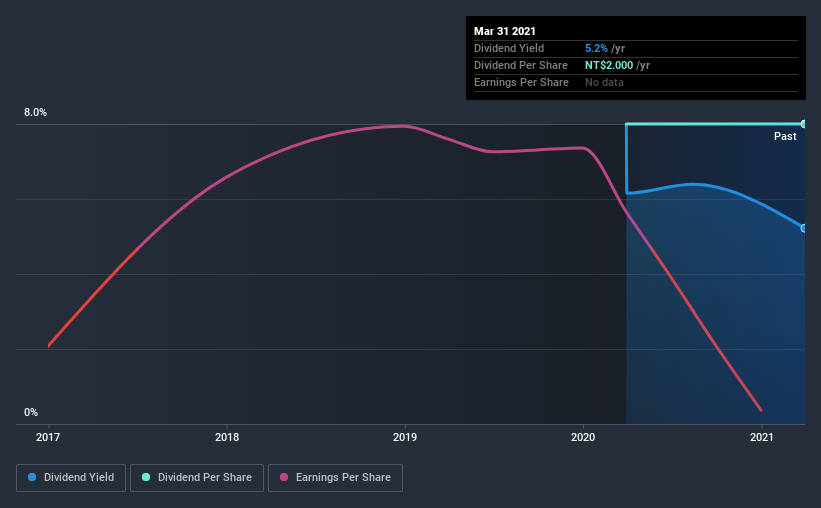Factors Income Investors Should Consider Before Adding Tigerair Taiwan Co., Ltd. (GTSM:6757) To Their Portfolio

Could Tigerair Taiwan Co., Ltd. (GTSM:6757) be an attractive dividend share to own for the long haul? Investors are often drawn to strong companies with the idea of reinvesting the dividends. Yet sometimes, investors buy a stock for its dividend and lose money because the share price falls by more than they earned in dividend payments.
Tigerair Taiwan has only been paying a dividend for a year or so, so investors might be curious about its 5.2% yield. Some simple analysis can reduce the risk of holding Tigerair Taiwan for its dividend, and we'll focus on the most important aspects below.
Explore this interactive chart for our latest analysis on Tigerair Taiwan!

Payout ratios
Dividends are usually paid out of company earnings. If a company is paying more than it earns, then the dividend might become unsustainable - hardly an ideal situation. As a result, we should always investigate whether a company can afford its dividend, measured as a percentage of a company's net income after tax. While Tigerair Taiwan pays a dividend, it reported a loss over the last year. When a company is loss-making, we next need to check to see if its cash flows can support the dividend.
Unfortunately, while Tigerair Taiwan pays a dividend, it also reported negative free cash flow last year. While there may be a good reason for this, it's not ideal from a dividend perspective.
With a strong net cash balance, Tigerair Taiwan investors may not have much to worry about in the near term from a dividend perspective.
We update our data on Tigerair Taiwan every 24 hours, so you can always get our latest analysis of its financial health, here.
Dividend Volatility
From the perspective of an income investor who wants to earn dividends for many years, there is not much point buying a stock if its dividend is regularly cut or is not reliable. With a payment history of less than 2 years, we think it's a bit too soon to think about living on the income from its dividend. Its most recent annual dividend was NT$2.0 per share.
We like that the dividend hasn't been shrinking. However we're conscious that the company hasn't got an overly long track record of dividend payments yet, which makes us wary of relying on its dividend income.
Dividend Growth Potential
The other half of the dividend investing equation is evaluating whether earnings per share (EPS) are growing. Over the long term, dividends need to grow at or above the rate of inflation, in order to maintain the recipient's purchasing power. Over the past five years, it looks as though Tigerair Taiwan's EPS have declined at around 19% a year. A sharp decline in earnings per share is not great from from a dividend perspective, as even conservative payout ratios can come under pressure if earnings fall far enough.
We'd also point out that Tigerair Taiwan issued a meaningful number of new shares in the past year. Trying to grow the dividend when issuing new shares reminds us of the ancient Greek tale of Sisyphus - perpetually pushing a boulder uphill. Companies that consistently issue new shares are often suboptimal from a dividend perspective.
Conclusion
Dividend investors should always want to know if a) a company's dividends are affordable, b) if there is a track record of consistent payments, and c) if the dividend is capable of growing. Tigerair Taiwan's dividend is not well covered by free cash flow, plus it paid a dividend while being unprofitable. Earnings per share have been falling, and the company has a relatively short dividend history - shorter than we like, anyway. In this analysis, Tigerair Taiwan doesn't shape up too well as a dividend stock. We'd find it hard to look past the flaws, and would not be inclined to think of it as a reliable dividend-payer.
It's important to note that companies having a consistent dividend policy will generate greater investor confidence than those having an erratic one. However, there are other things to consider for investors when analysing stock performance. For example, we've identified 5 warning signs for Tigerair Taiwan (2 don't sit too well with us!) that you should be aware of before investing.
If you are a dividend investor, you might also want to look at our curated list of dividend stocks yielding above 3%.
If you decide to trade Tigerair Taiwan, use the lowest-cost* platform that is rated #1 Overall by Barron’s, Interactive Brokers. Trade stocks, options, futures, forex, bonds and funds on 135 markets, all from a single integrated account. Promoted
Valuation is complex, but we're here to simplify it.
Discover if Tigerair Taiwan might be undervalued or overvalued with our detailed analysis, featuring fair value estimates, potential risks, dividends, insider trades, and its financial condition.
Access Free AnalysisThis article by Simply Wall St is general in nature. It does not constitute a recommendation to buy or sell any stock, and does not take account of your objectives, or your financial situation. We aim to bring you long-term focused analysis driven by fundamental data. Note that our analysis may not factor in the latest price-sensitive company announcements or qualitative material. Simply Wall St has no position in any stocks mentioned.
*Interactive Brokers Rated Lowest Cost Broker by StockBrokers.com Annual Online Review 2020
Have feedback on this article? Concerned about the content? Get in touch with us directly. Alternatively, email editorial-team (at) simplywallst.com.
About TWSE:6757
Outstanding track record with flawless balance sheet.
Similar Companies
Market Insights
Community Narratives


